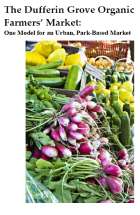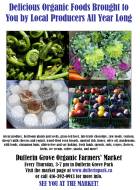
Pages in this Folder:

Related Folders:
See also Department Site Map
Publications:
Market-related videos
Comments?
For the basics, see
- Website & Privacy Policies
- How To Get Involved
- The Role of the Park
Search options:
Department Site Map
Custodians:
 Food News 2007
Food News 2007
Quick Page Table of Contents
Scanning...
Food News 2007
posted October 31, 2007
Views on Antibiotics and Dairy
The market has received an invitation to provide feedback on acceptable standards for "withdrawal times for antibiotic use in dairy animals in Canada" (i.e. how long after antibiotic treatment for an illness the milk of a dairy animal must remain out of the organic stream), and to pass along the opportunity to others who might like to be included in this consultation. We thought some of you might like to learn more about the issue, and we would like to provide a little background, including some diverse opinions from farmers. This isn't at the level of expert knowledge, so if you're really interested, you may want to do further research.
The rules vary widely in different parts of Canada right now--and even among different certifying bodies within our province--with Ontario's OCPP-ProCert standard highest at "lifetime", and Canada's national standard (and Quebec's) at 14 days.
So what's the situation for farmers?
posted October 31, 2007
BREAKING NEWS: OFFICIAL: Organic really is better
THE biggest study into organic food has found it is more nutritious than ordinary produce and may help lengthen people's lives.
The evidence from the $27million four-year European Union-funded project should end years of debate and is likely to overturn official advice that eating organic food is a lifestyle choice and that there is no clear evidence that it is "more nutritious than other food".
The study will be peer reviewed and published over the next 12 months. But already one conclusion is clear: organically produced crops and dairy milk usually contain more "beneficial compounds" - such as vitamins and antioxidants believed to help to combat disease.
posted on August 09, 2007
Monsanto Patents Rejected
MONSANTO PATENTS ASSERTED AGAINST AMERICAN FARMERS REJECTED BY PATENT OFFICE:
Published: July 24, 2007
Source: http://www.pubpat.orgNEW YORK – July 24, 2007 -- The Public Patent Foundation (PUBPAT) announced today that the United States Patent and Trademark Office has rejected four key Monsanto patents related to genetically modified crops that PUBPAT challenged last year because the agricultural giant is using them to harass, intimidate, sue - and in some cases literally bankrupt - American farmers. In its Office Actions rejecting each of the patents, the USPTO held that evidence submitted by PUBPAT, in addition to other prior art located by the Patent Office's Examiners, showed that Monsanto was not entitled to any of the patents.
Monsanto has filed dozens of patent infringement lawsuits asserting the four challenged patents against American farmers, many of whom are unable to hire adequate representation to defend themselves in court. The crime these farmers are accused of is nothing more than saving seed from one year's crop to replant the following year, something farmers have done since the beginning of time.
posted on July 08, 2007
Imports from China
In Fear and Scandal, Some Find a New Drum to Beat
By: ANDREW MARTIN
Published: July 8, 2007
Source: nytimes.comTHERE was a time the words “Made in China” immediately evoked “shoddy.” Lately, many Americans are thinking “danger.”
After reports of toothpaste laced with poison, tires that fall apart on the highway, contaminated fish and pet food, who wouldn’t be scared?
But for some people, those fears are a dream come true. Politicians, catfish farmers, consumer activists, to name a few.
For years, these groups have been trying to raise alarms about the wholesomeness of products from China as they pursue their own causes. Now, they revel in the chance to give China a few choice shots.
posted on July 05, 2007
Farmers say Push Local Produce
Queen's Park should push local produce, farmers say
Published: (Jul 3, 2007)
Source: guelphmercury.comFarmers' markets are booming across Ontario thanks to environmentally conscious shoppers, but the province needs to help put local produce on grocery store shelves if the farm sector is to survive, advocates say.
Aided by the push to cut transportation-related carbon emissions, the number of farmers' markets has ballooned, said Bob Chorney, executive director of Farmers' Markets Ontario.
"People are becoming increasingly concerned about what it takes to get their food to them," said Chorney, who added the average meal travels some 4,000 kilometres.
"It takes 535 calories to move a seven-calorie strawberry from California to Ontario. It takes 400 times more energy to ship lamb from New Zealand than it does to buy local lamb."
posted on July 05, 2007
Competition faced by local growers
The hopeless blight on our strawberries
By: CATHERINE PORTER, ENVIRONMENT REPORTER
Published: July 01, 2007
Source: thestar.comRed-tailed hawks circle overhead as Ron Breckon eases the family van along the rutted dirt road.
The seats behind him have been ripped out. In their place are 69 trays of strawberries, some picked just seconds before.
"I'll have to drive carefully," he says, rolling up the window and cranking the air conditioning. Already, the cabin is dense with the perfume of warm berries. Any hotter and they will melt before he delivers them to the grocery store.
It takes him only 20 minutes – past where the farm fields give way to more subdivisions – to roll into the lot behind Food Basics in Georgetown.
Already in the lot are two 18-wheel tractor-trailers, one finishing a delivery while the other waits its turn.
They are refrigerated, and each has space for at least 20 loads the size of Breckon's.
"Oh Jesus, oh my God – we've got to wait," he says, gripping the wheel tightly. "We've got perishable stuff here. If it's left in the vehicle in the sun, it's going to be roasted."
posted June 27, 2007
The Rising Cost of Food
From TIME magazine
Thursday, Jun. 21, 2007
The Rising Costs of Food
By John Cloud
All but the wealthiest readers will have noticed by now that food costs have risen this year. In May grocery prices were 4.4% higher than they were the previous May. If 4.4% doesn't sound like much--you spend $104.40 now for a cartful that was $100 a year ago--it's a huge deal to food producers and to budget shoppers, who are making lots of casseroles. The Department of Agriculture anticipates that grocery prices won't significantly fall before January; if the USDA is right, you would have to go back to 1990 to find a bigger single-year increase.
New Markets in Toronto
posted June 06, 2007
Foodshare has published a list of new markets in its recent newsletter (there are 6 new markets!!):
Toronto is blooming with farmers markets this spring. In addition to those we know and love, there are several new markets opening. Three new markets are opening this weekend, with much fanfare, fun, food and anticipation.
Don't be shy, check them out--the weather will be great so bring the family. You can enjoy some newly harvested asparagus, lettuce, spinach, mustards, radishes and maybe even some ramps or fiddleheads.
Read more "New Markets in Toronto">>
Feeling Confused?
posted June 03, 2007

Bob Chorney
Farmers' Markets Ontario
If you picked up The Star last Wednesday [May 30, 2007] or tuned in to Metro Morning a couple of days later, you might be feeling more wary about buying a head of lettuce than a used car.
"Unbeknownst to some unsuspecting shoppers, our markets have been quietly infiltrated by resellers, a.k.a. produce jockeys, peddlers and hucksters," says Jennifer Bain in her "Bringing Country Food to the City" article. That "produce jockeys..." phrase comes straight from Bob Chorney, the head of Farmers' Markets Ontario, who shared his concern about "people living in condos and driving fancy cars" posing as farmers at markets in an early morning interview on CBC.
posted May 02, 2007
Fair Trade Weeks
Saturday, May 5th from 3pm-7pm. "Fairtraders and Friends" are having a party and YOU are invited!
In honour of the 10th anniversary of certified Fairtrade in Canada, "Fairtraders and Friends" are celebrating the difference fair-trade, and organizations whose work embodies the spirit of fair-trade, are making. "Fairtraders and Friends" are folks who work for justice in food, housing, and human rights.
Join us for food, music, lots of info, and of course, special festivities! Bring the family and friends. See you there! Poster
Saturday, May 5th from 10 a.m.-5 p.m. Annual Fair Trade Fair, at St Barnabas Church, 361 Danforth Avenue (near Chester Subway).
Saturday May 12th from 11-7 p.m.: Global Aware Fair Trade Marketplace, at GlobalAware Kensington, 19 Kensington Avenue (at Dundas St. W).

The first two weeks in May have been designated International Fair Trade Weeks around the world. This is the time to remind consumers that their purchasing choices make a difference to people living in developing countries. The International system of Fair Trade ensures that producers receive a fair price for the agricultural products they grow and the handicrafts they produce.
“Kid’s need Fair Trade” is this year’s theme. Why do kids need fair trade?
A huge number of children in the world are suffering from unrestricted and exploitative trade practices. In 2004, 246 million children between 5 and 17 were child workers; 73 million of those children were less than 10 years old. In fact, the situation of most children in most of the least developed countries is miserable. They are deprived of the basic needs of life, like food, clothing, shelter, health care and education. The root cause of all this is poverty.
Fair Trade addresses poverty by offering the parents of these children an opportunity to earn a decent living. This means that they can afford to provide food and shelter for their children and can offer them education and adequate medical attention. This is the way to a brighter future.
Fair Trade is Growing in Canada: Transfair Canada certifies fair trade products, promotes and monitors the growth of fair trade sales in Canada. Their statistics show that Fair Trade sales in Canada have been increasing on an average of 55% per year since 1999!
Join us in celebrating the growth of this movement!
For more information please contact The Toronto Fair Trade Network c/o Ten Thousand Villages at (416) 703-2263 or toronto.queen@villages.ca
posted on April 15, 2007
Organics: A Poor Harvest for Wal-Mart
Organics: A Poor Harvest for Wal-Mart
By: Pallavi Gogoi
Published: April 12, 2007
Source: BusinessWeek.comAfter the retailing giant laid out ambitious plans to offer organic food last year, farmers say it's backing off.
Last fall, Peter Ricker got an order from Wal-Mart Stores (WMT) for organic apples that was the biggest he'd ever seen. "I'm talking trailer truckloads," says the 34-year-old, eighth-generation apple farmer in Maine. Ricker had heard of the giant retailer's push into organics, and he thought the order could be the beginning of a surge in demand. But that wasn't the case. While most retailers place orders with Ricker Hill Orchards once a week, Wal-Mart never came back.





 Printer friendly version
Printer friendly version